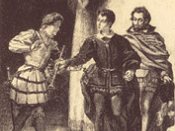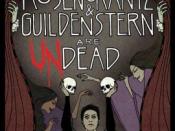MOOD
There is very little emotion in this play--even at the end, when the main characters disappear (seemingly dying); the audience does not exactly feel bad for them. This is perhaps because the audience is so muddled by the play's events that they find it difficult to align themselves with any particular character. Comedy is interspersed with tragedy in such a way as to make the viewer unsure of just how to react. Thus, the prevailing mood of the play may be a kind of darkly humorous confusion, throughout which the audience is just as confused as Rosencrantz and Guildenstern about what is real, what is fake, and what is really happening at the castle.
For all their angst, Rosencrantz and Guildenstern are clowns in the end. Their attempts to understand their situation read like comic routines rather than desperate grasping at straws. However, there is something chilling in their complete inability to keep their heads above water.
As Rosencrantz says at the end, throughout the play, they have done nothing wrong.
They are likable enough. And yet they are doomed to die, because of decisions they had no part in that they didn't even know were being made. Another essential ingredient to their demise is, however, their own foolishness. The play revels in absurdity, moving through numerous comic set pieces. Yet Stoppard does not allow us to forget that all of their ineffectual humorous rambling actually has consequences: by the end of the play, it has killed them. This is hard to swallow for an audience who must feel fairly similar to Rosencrantz and Guildenstern: unsure of what they're witnessing, and unsure what to do about it. This sort of confusion is surely designed, at times, to make the audience uncomfortable--but never far from a laugh.


